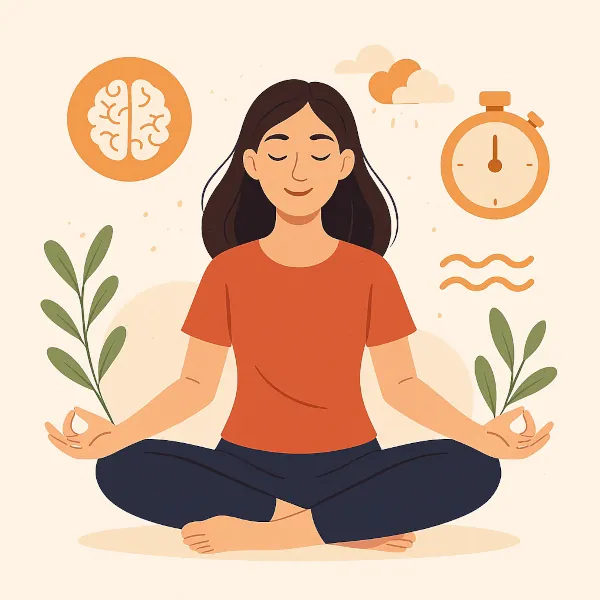Did you know that over 70% of people report feeling stressed daily? Reducing stress has become one of the greatest challenges of modern life. With the fast pace of daily routines, both the body and mind suffer from the impact of overstimulation, mounting responsibilities, and constant worries. The good news? There are highly effective techniques that you can start using today to relieve stress and boost your mental wellbeing. 🌿
Why Has Stress Become So Common? 🤯
Have you ever wondered why so many of us feel constantly under pressure or overwhelmed? Chronic stress is closely tied to today’s lifestyle: overwork, digital overload, poor diet, lack of quality sleep, and insufficient physical activity.
💡 Fun Fact: Research shows that around 70% of people experience daily stress (source: American Psychological Association).
Social media fuels endless comparisons with others, feeding anxiety and low self-esteem. The culture of non-stop productivity reinforces the notion that being constantly busy equals success — which only adds more psychological pressure.
What Happens in Your Body When You’re Stressed? 🧠
When stressed, your body releases hormones like cortisol and adrenaline. While these are helpful in genuine danger, chronic overproduction can cause sleep disturbances, anxiety, depression, low immunity, and heart problems.
The autonomic nervous system stays in high alert, making it hard to switch off. Digestion is affected, sleep becomes light and broken, and people often turn to alcohol, cigarettes, or processed food to cope — which only worsens the issue.
Effective Techniques to Reduce Stress 🌈
Explore the top strategies to ease stress and restore emotional balance:
1. Practise Mindfulness 🧘♂️
Mindfulness helps you stay present, cutting through negative thoughts and easing anxiety. New to it? Try apps like Headspace, Calm, or Insight Timer for guided meditations. Just 10 minutes a day can have a big impact.
You can even practise mindfulness in everyday tasks — like brushing your teeth, walking, or eating — by focusing on bodily sensations, breathing, and your surroundings.
2. Exercise Regularly 🏃♀️
Activities like walking, running, dancing, or yoga release endorphins — your natural feel-good chemicals.
Exercise also improves sleep, strengthens the immune system, and sharpens focus. Aim for at least 30 minutes of moderate exercise on most days.
3. Try Breathing Techniques 🌬️
Controlled breathing calms your nervous system. Give this a go: inhale for 4 seconds, hold for 4, exhale for 4 — repeat for 2 minutes.
Popular methods include alternate nostril breathing (from yoga) and the 4-7-8 technique, known for promoting relaxation.
4. Prioritise Quality Sleep 😴
Sleep is vital for recovery and emotional balance. Stick to a regular sleep schedule, limit screen time before bed, and create a calm sleep environment.
Top tips: avoid heavy meals at night, cut caffeine after 4pm, and wind down with a bath or a good book.
5. Eat a Balanced Diet 🥑🍌
Foods high in tryptophan — like bananas, oats, nuts, and eggs — along with omega-3s, magnesium, and B vitamins, support brain health and mood regulation.
Include antioxidant-rich foods like berries, leafy greens, and seeds. Avoid excess sugar, alcohol, and processed foods, which can increase fatigue and irritability.
6. Seek Therapy and Practise Self-Care 💬🛁
Talking to a therapist, journalling, or making time for your favourite hobbies can help you process emotions.
Cognitive Behavioural Therapy (CBT) is especially effective for managing stress. Self-care might also include baths, gardening, art, music — anything that brings you joy.
7. Spend Time With Loved Ones 👨👩👧
Strong social connections help regulate stress. Whether it’s chatting with a friend, spending time with family, or sharing a hug — all of these release oxytocin, the feel-good hormone.
8. Limit Screen Time 📵
Too much screen exposure can overwhelm the brain. Set boundaries for phone or computer use and schedule screen-free moments to mentally recharge.
How to Start Today? 🗓️
- Pick one of the techniques above and practise it for 10 minutes a day.
- Try different methods to see what fits you best.
- Place visual reminders around your home or office.
- Invite a friend to join you for accountability and motivation.
How to Apply It in Daily Life? 📆
- Use mindful breathing during work breaks.
- Meditate before bed to wind down.
- Turn your morning walk into a mindfulness practice.
- Prepare meals calmly and attentively.
- Create a relaxing corner at home with cushions, plants, and soothing music.
Extra Tip 🍵
Cut back on caffeine, as it can heighten stress symptoms. Instead, enjoy calming herbal teas like chamomile, lavender, fennel, or passionflower.
Final Thoughts ✅
Reducing stress is a journey that takes patience and commitment — but the rewards are immense: better focus, emotional stability, and overall wellbeing. Start today with small changes, and notice how your routine transforms.
📢 Found this useful? Share it with someone going through a stressful time who could benefit from these tips!

